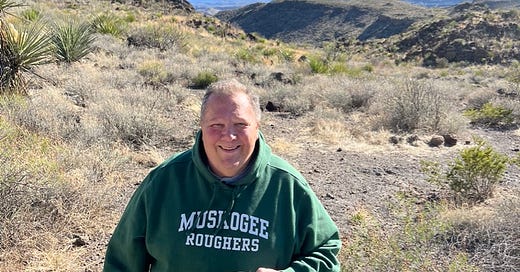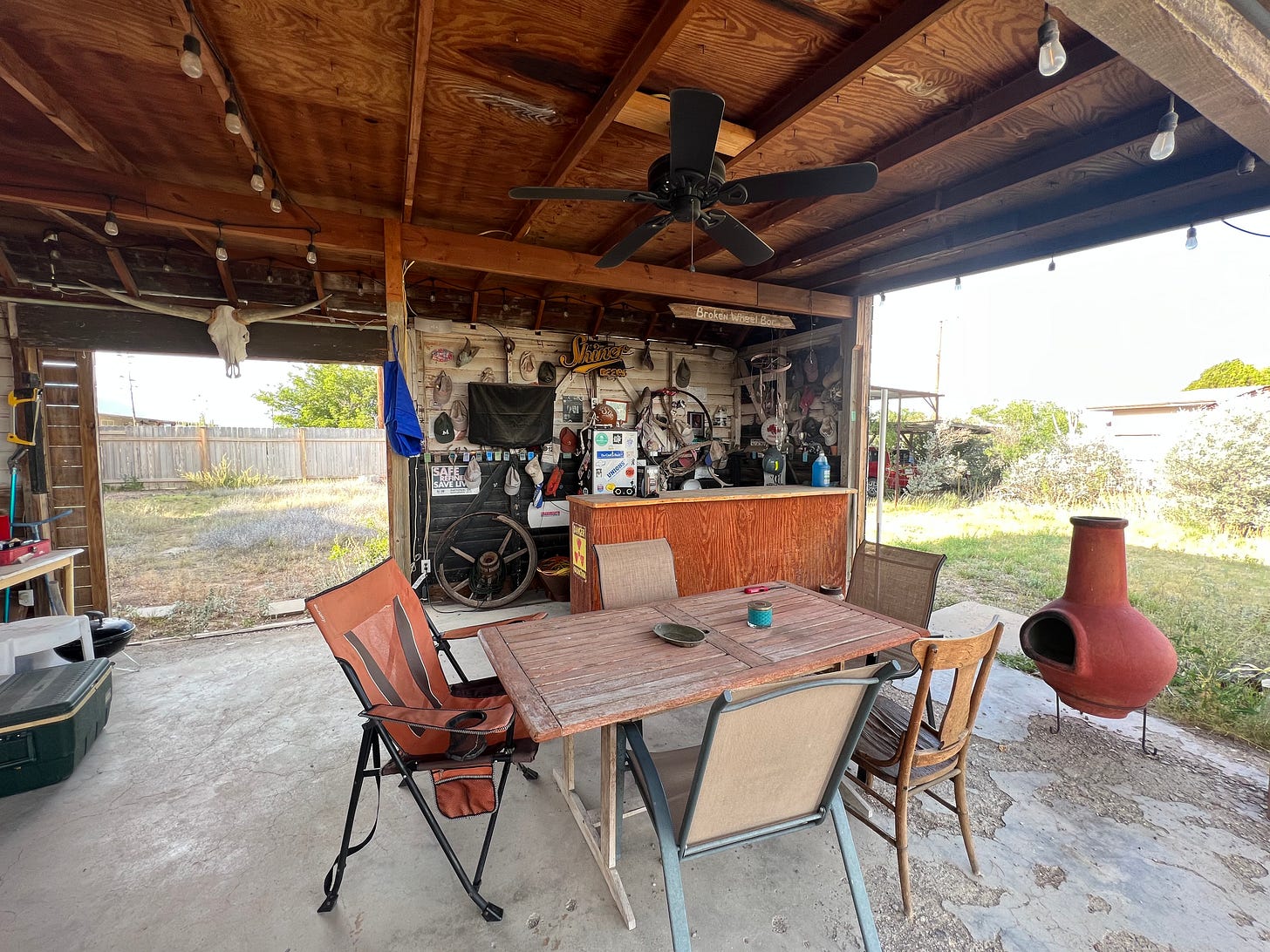James Gaston, 1962-2023
My friend James Gaston died as he had lived … on his own terms. He leaves behind many friends who’d like to imitate his example.
Welcome to another installment of Life Its Ownself. I apologize for not publishing a “Three-Point Shot” on Friday, but my weekend was, as you’ll see, overtaken by events. Please forgive me.
I hope that those of you who knew James will share this with his many other friends.
(James Gaston at the head of Fresno Canyon, Big Bend Ranch State Park, March 2023.)
I.
Last March, my friend James Gaston invited me to go camping with him in Big Bend Ranch State Park. A primitive campsite he’d wanted to visit for years was available, and he was going. Did I want to go along? I had a few reservations — I am not a camper — but was eager for an adventure with him.
We packed up his big Suburban and headed to the park. Once inside its 300,000 acres, we trundled across breathtaking landscapes until we got to our site, which was at the head of Fresno Canyon.
We set up camp – ice chests in the shade, cooking equipment carefully stored in plastic chests, the all-important toilet paper near at hand. Once we were done, we cracked open a couple beers, sat in our camp chairs and looked south over the canyon which descended all the way to the Rio Grande and the rugged mountains of Mexico beyond.
It was a lovely afternoon. The sun rode high in a cloudless sky. A light breeze blew; other than its soft rustle, it was totally quiet. There was no one, we calculated, for at least a couple miles around. James seemed unusually calm and reflective. Then it struck me: this was “Peak James” – out in the wilderness, far from work and phones and pressure, his camp set up and in order, basking in the warm sun and absorbing the majestic energy of all that light and land and sky around him. He was in his “happy place,” to use the trite formulation of our time.
Which is why, when I learned last week that he’d died in his sleep while camping in a remote corner of the San Juan National Forest, my feelings were mixed. I felt deep anguish at the loss of a great friend, and peace that he’d passed away doing what he loved most.
He’d planned the camping trip for months. He would wind his way west from Oklahoma into the Mountain West, savoring the lovely state parks and great national forests along the way. He thought he might wander up into Idaho and then down through Utah and Arizona and end up back in Marathon in time for his August birthday.
II.
From time to time over the last dozen years or so, I would take stock of my life, evaluate my choices and conclude, sometimes to my surprise, that James Gaston was my best friend — whatever that means.
It was surprising because James and I did not share many of the indicia of best friends. We had not gone to the same schools, or played sports, or worked closely together in the Texas Capitol. Many of those youthful experiences lock in lifelong friendships, establishing the shape of the time to come. Ours was more a shifting of tectonic plates, eventually settling into place after moving around for a long time.
We were not the kind to talk every day. We did not hang out at every opportunity. We did not, as is often the case among friends in politics, compile and share enemies’ lists.
Instead, after not seeing or talking to each other for a few months, we could pick up the phone and be right back at it: work (a little, not too boring), politics (even less, not too boring), Texas and Oklahoma State athletics, mutual friends, road trips, plans to meet up in Marathon. I’d ask after his saintly mom; he’d ask after my brilliant deputy, who had charmed him (and vice versa) when we all went out to lunch.
Really, we only spent time together at his home in Marathon, to which I was frequently invited as a houseguest and occasional house sitter.
III.
I first met James in the summer of 1988. I was a new law school graduate, studying for the bar while working at a San Antonio law firm. He was squiring around a Texas Supreme Court justice, “dragging the sack” for campaign contributions, as they say in the business. While my firm’s partners jawed with the Justice, James and I sat in a corner, getting to know each other and chatting politics. He was competent, relaxed, funny, and irreverent. I liked him immediately.
For the next 20 years, we both worked in Texas politics and government, never in the same place or capacity at the same time. He worked for a state senator while I was in the Governor’s Office; he was a chief of staff in D.C. while I was a chief of staff in Austin. We’d run into each other occasionally, catch up for a few minutes, and move on.
IV.
That changed in 2009 when James bought his home in Marathon. He was working for a union then, on field organizing assignments that would last from a few weeks to six months. He decided Marathon would be his base camp, accessible to the airport in Midland-Odessa when he needed to travel.
It was too much house from the git-go: a rambling, three-bedroom, two-bath main house that would charitably be described as “split-level” along with a stand-alone one-bedroom “casita” in the back. And that was intentional: James wanted a house that would allow him to host his friends when they visited. And so it was. Many people enjoyed his hospitality there, perhaps me most of all.
V.
He fixed up the back patio of his house into the Broken Wheel Bar, complete with a barbecue grill, two dorm refrigerators stacked on top of each other, and a TV set for watching football games on fall weekends. It became a gathering place for both neighbors and out-of-town visitors. Everyone’s favorite feature was a chimenea which, except for the dead of summer, burned piñon and other fragrant woods to the delight of James, his visitors, and the whole neighborhood.
My best conversations with James were in the Broken Wheel, usually in the evenings on into the night. If it was warm, a fan turned slowly overhead. If it was cold, we fired up the chimenea.
We talked about our upbringings. He worshipped his father and adored his mother. Both instilled in him a deep belief that the quality of your life was a function of how much you lived for others. He had a big family and still was close to them, far-flung as they were. I envied that.
We talked about the prostate cancer he’s been diagnosed with and the damage it had wreaked as it spread to other parts of his body, pummeling both flesh and spirit. Chemotherapy, and hormones, and aging, had left him with localized arthritis and radiculopathy in his feet that made it painful just to stand. At times it was intolerable to him. I tried to be sympathetic, secretly grateful that I’d been spared these horrors.
And, of course, he told stories. James had a million stories, all of them entertaining and many unpublishable even in a newsletter of such low standards as this one. He had stories from college, and from his time around the Legislature. He had stories from his brief but memorable tenure as the chief of staff to a particularly infamous D.C. Congresswoman. He had stories of his adventures in post-Soviet Eastern Europe, teaching democracy and government to new leaders who had no idea how they worked.
In typical James fashion, the stories usually had nothing to do with his work or mission, but instead the marvelous people and adventures – and bars and nightclubs – he tumbled into along the way.
VI.
About five years ago, James began feeding and watering the neighborhood birds. Every morning and afternoon, he’d refill a couple repurposed garbage can lids with water and then spread a few cupfuls of birdseed on the ground. Within minutes, several dozen birds would be milling around on the ground in front of his window while he watched in delight.
After a while, he noticed that the bigger birds – doves and quail – were crowding out the littler birds – swifts and swallows and the like. He rigged up a bird feeder that only the smaller birds could get at and filled it, too, with birdseed every day.
“Put the jam on the lower shelf,” he laughed. I dubbed him “St. James of Brewster.”
VII.
James loved to read, and his house holds a library of at least a thousand volumes, much of it books he’d bought in airports during his peripatetic days. In the afternoons, after he’d finished work, he liked to sit in the Broken Wheel Bar and read. I frequently joined him, enjoying our companionable silence, absorbed in the world we each saw on the printed page.
VIII.
I thought about beginning this essay with the marvelous Shakespeare quote from Richard II, “For God's sake, let us sit upon the ground, and tell sad stories of the death of kings.” But no one would have mocked me more relentlessly for such romantic twaddle than James himself. He had a cynic’s hard eye for the world, but deep inside, a gentle and optimistic heart.
In his life, James loved much and lost more. His body, a source of pride and accomplishment in his youth, had betrayed him in middle life, vexing him with constant pain for his last decade. But his spirit, his humor and his gentleness survived, a gift to all of us who knew and loved him.
Godspeed, James Gaston. I hope the view is wonderful where you are.
(Ed. note. An earlier version of this essay referred to Shakespeare’s William II. It is Richard II. I regret the error.)






Thank you Deece for this beautiful and heartfelt tribute to our friend James. He was such a great guy and I have wonderful memories of him from our Richard Jenson campaign days and Carl Parker Senate time together. I was shocked to hear he passed away last week and didn’t know much about his life these past few years so your article gave me great joy and comfort to read. RIP Gaston❤️🙏🏼
I {{{{heart}}}} this, Deece. Thank you for sharing.